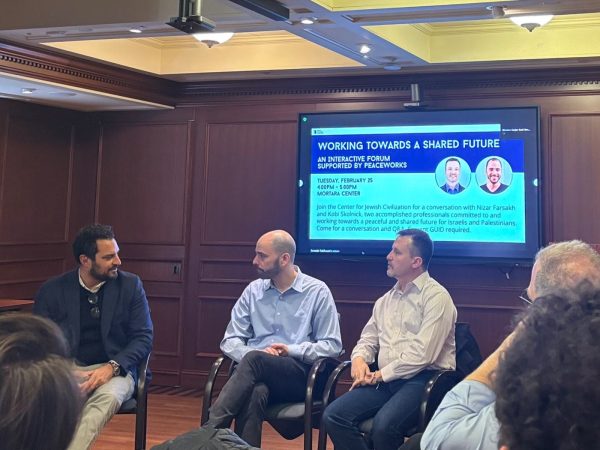Conflict resolution professionals advocated for open dialogue between Israelis and Palestinians at a Georgetown University event Feb. 25.
At the event, two speakers — Nizar Farsakh, a lecturer on international affairs at George Washington University, and Kobi Skolnick, the director of leadership development at the Center for World Religions, Diplomacy and Conflict Resolution at George Mason University, which focuses on positive change and global civil society development — called for open dialogue to play a role in creating a shared, peaceful future in the Middle East. The Center for Jewish Civilization, an interdisciplinary program studying Israel and Jewish history, hosted the event, the second installment of its partnership with the Peace Works Foundation, which promotes peace in Israel and Palestine.
The event comes a little over a month after the Israel-Hamas ceasefire took effect Jan. 19 after a year and a half of violent military conflict since Oct. 7, 2023 — resulting in tens of thousands of deaths in Gaza amid a humanitarian crisis and mass displacement.
Farsakh previously advised Palestinian leaders on negotiations with Israel between 2003 and 2008 and worked for the Project On Middle East Democracy, a nonprofit organization that advocates for U.S. policies that emphasize human rights. Skolnick founded Lead for Impact, a consulting company for leaders that emphasizes global engagement, and worked on humanitarian efforts for UNICEF, a nonprofit global aid organization.
Farsakh said his work aims to combat the misconception that Palestinians are divided over their support for particular organizations rather than united in an effort to seek freedom.

“When people talk about peace, what Palestinians hear is, ‘you want us to be quiet.’ Palestinians don’t want peace. Palestinians want freedom,” Farsakh said at the event.
Though the two speakers come from different backgrounds — Farsakh, who is Palestinian, grew up in the United Arab Emirates, while Skolnick grew up in a devout Jewish family in Israel — both agreed on the urgency of peacebuilding in the region.
Skolnick said it is extremely important that discussions about reconciliation take place between Israelis and Palestinians rather than outside observers.
“Peacebuilding and peacebuilders should always come from the societies themselves, because they know what they’re talking about,” Skolnick said at the event. “They’re not afraid to talk about Hamas. They’re not afraid to talk about extremism.”
Farsakh said mistrust between both parties is often a barrier towards peacebuilding.
“The majority of Israelis and the majority of Palestinians believe that the two-state solution is the desirable solution, but also the majority of Palestinians and the majority of Israelis do not think that it is possible because the other side is whatever,” Farsakh said.
Skolnick said that despite his background in Israel, his commitment to building peace has allowed him to work with communities on both sides of the conflict. He added that in his experience, fostering conversation has created opportunities for dialogue and reconciliation as opposed to division between Israelis and Palestinians.
“I engage in very painful conversations with Gaza, East Jerusalem and Israelis that have been working on start-ups and collaboration,” Skolnick said. “I connect with a lot of peace activists, Palestinians, because they went through pain, and then we connect, and we both know that we decided a different way.”
Skolnick urged younger generations seeking peace to use online platforms to make their voices heard and engage in discussions.
“There is a new generation that’s intrinsically different,” Skolick said. “Because a lot of their world is virtual, it’s on the phone. They have identities that expand outside of their geography.”
“But all they know is that what they’re living is not okay and that they deserve better, and that the older generation failed them,” he added. “So they’re not waiting for the political parties to tell them what to do and give direction.”
Skolnick said a nuanced understanding of conflicts in the Middle East is essential to moving towards a peaceful resolution.
“It’s important to understand again the psycho-historical trauma in both societies informing the person with the gun,” Skolnick said.